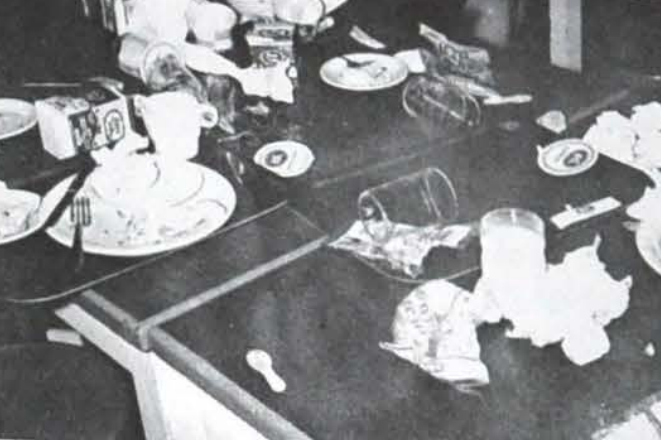Looking Back
January 31, 2019
The following article contains summaries from the 2018-2019 school year of articles from past issues of The Central Digest.
Looking Back: Dropping Out Became a Huge Problem During the 1963-1964 School Year

Preservation of Chattanooga Central History
REGISTRATION DAY 1963 — This was the scene at Central as Principal Hobart Millsaps welcomed students, new and old.
EDITOR’S NOTE: The following article contains summaries of articles from past issues of The Central Digest. On occasion, the Digest will look back into our archives to see what was happening around Central High in the past
Student Body Enrollment Reaches Five Year High
September 1963
Central had a great start to its fifty-seventh year, with an initial enrollment number of 1,739 students. This set a five year record since the school population had gained 125 students. The increase was the largest since the 1957-1958 school year, when 2,018 students attended.
Central Receives Bellamy Flag Award
October 1963
The Bellamy Flag award was presented to Central on October 11, 1963. The flag had flown over Washington D.C. on May 18 of that year, in honor of Francis Bellamy’s birthday. The flag was displayed in a new trophy case that was purchased by the Parent-Teacher-Student-Association. The flag was flown for a couple for days and during special events, such as homecoming, until it was retired.
Senior Class Presents Play Tonight at 8
November 1963
The senior drama students were set to present a program titled “Fresh Air” on the night of November 22. “Fresh Air” was set to take place on a corner of Los Angeles where the mayor was conducting a speech in a park. The production followed the mayor’s plight during his kidnapping. The cast performed a dress rehearsal the Wednesday before the show, and a skit for the entire school the day before the show.
Speaker Claims that Dropouts Make Decisions Too Fast
December 1963
The President of Chattanooga Savings and Loans, Mr. W. Arnold Chambers, visited Central in December of 1963. Chambers strongly encouraged each student to finish high school and make their best effort to continue their studies in college. He also addressed the increase of juvenile delinquency at the time. Chambers denounced modern society, claiming that it insinuated that students grow up faster than they should.
School Drop-Outs Reach National and Local Highs
January 1964
Students dropping out was not only a problem for Central, but a problem for the entire nation during that time period. Statistics showed that 30 percent of high school students in the United States did not make it to graduation. For Central, approximately 41 students had dropped out during the first semester of the 1963-1964 school year. This number was huge in comparison to the total of 50 students that had dropped out the year before. The main reasons for the spike in dropouts included teenage marriages, joining the armed forces, and leaving to focus on work for jobs.
For those interested, the archived Central Digest publications can be found on the Preservation of Chattanooga Central History website: https://chattanoogacentralhistory.com/digest/
Looking Back: Class of 1962 Student Council Backs Clean-Up Plan to Improve Appearance of School
Preservation of Chattanooga Central History
TIME TO TIDY UP — The Student Council took pictures of areas that needed to be cleaned up with the plan of showcasing the same areas after the clean-up effort.
Students Enlist in J.A. Business
September 1961
The Junior Achievement (J.A.) program came to Central to organize students in the Chattanooga area into small businesses that were run completely independently. Their motto “Learn by Doing” included introducing the American business system to young people all over the country. At the end of the year, these student run businesses have their debts paid off and profits divided. In the previou year, there were 18 J.A. companies in the Chattanooga area with over 200 participants. For the 1961-1962 school year, J.A. planned to have 34 companies with as many participants as possible. One Central student, Steve Tingle, was involved in J.A. in the previous school year. He was the president of Wontsum Printing Company and was elected President of the Year for Chattanooga and was runner-up for the award statewide. He was also named the best salesman in the city and fifth overall in the South. J.A. provided great opportunities to students like Tingle, who could catch a glimpse of what their future might hold.
Two Enter Central From Cuban Base
November 1961
Central brings in new students every year: freshmen, transfers, those who have moved, and many more. However, in 1961, Central welcomed two students from a unique background. Then Senior Sidney and Junior Phyllis Patchett entered the halls of Central after spending two years at the United States’ Naval Base in Guantanamo, Cuba; their father, a naval commander, had been stationed at the base. Despite being on foreign land, the Patchetts attended an American school, where they learned both English and Spanish. Both girls were active in their previous school; Sidney Patchett was vice president of the Student Council, on the yearbook staff, and was voted “Wittiest,” and Phyllis Patchett was treasurer of the Student Council, also on the yearbook staff, volunteered in the school’s library, a chairman of the property committee for the junior-senior play, and was voted “Best Dancer.” The Patchetts enjoyed living outside of the U.S. but were excited to see what their new home and school would offer them.
Dr. Derthick Gives Seniors Nine Rules for Happiness
December 1961
On November 30, 1961, Dr. Henry J. Derthick visited Central to speak to senior English classes. Dr. Derthick was the president emeritus of Milligan College and a member of Facing Forward, which focused on inspiring high school seniors. Seniors listened intently as Dr. Derthick discussed experiences in his life and 72 year long educational career. The theme of Derthick’s message was “Making Life Adjustments or Getting Along with Everyone with Whom You May Come Into Contact.” Derthick emphasized love in his message, and he was truly an inspiration to the class of 1962.
January 2 Marks Start of WPAG
January 1961
Before the school year’s winter break, Central received its very own radio station, WPAG (Wonderful Purple and Gold), with the purpose of informing students of school activities. WPAG first came into operation on the morning of January 2. The Student Council, the main sponsors for the station, spent their winter break preparing WPAG for the airwaves. At the time of publishing, the students in charge of WPAG were looking to add an intercom system to Central that would allow them to broadcast to the entire school. The Student Council Broadcasters Association, who was in charge of WPAG, consisted of 11 students: President Bill Carter, Vice President Stanley Sells, Skip Clemons, Bill Harless, George White, Ronnie Tucker, Johnny Slaten, Wanda Martin, Jeannie McCoy, and Diane Morrison.
“If You Don’t Care For Central Who Does?”
March 1962
Towards the end of the 1961-1962 school year, the Student Council pushed forward a cleaning campaign focused on improving the appearance of Central’s campus, which at that time was located on Dodds Avenue. Four areas were highlighted as needing the most effort from both the student body and faculty to clean up: the washrooms, cafeteria, hallways, and campus. The Student Council took several pictures of “dirty” areas like the one at the top of this article and posted them alongside pictures of the same area that had been tidied up, creating a before-and-after effect of the clean-up effort. The Council started this action because they saw the state of Central’s appearance and felt that visitors could not gain a favorable impression while there.
Many aspects of Central High School’s history, including past physical copies of the Central Digest can be found at the Preservation of Chattanooga Central website.
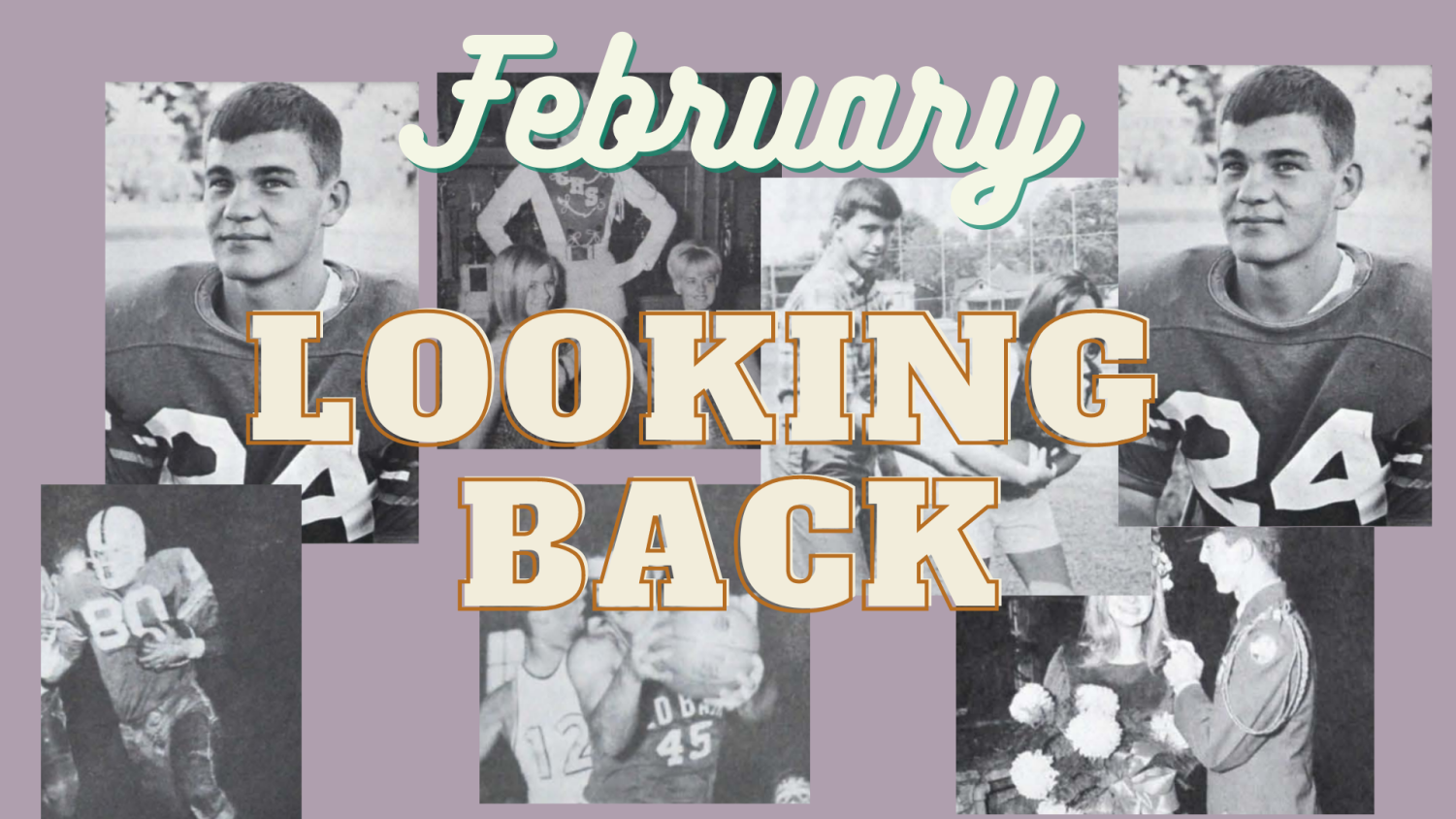
Central’s Purple Pounders was reputable for being one of the best basketball teams in the state…
Looking Back: In 1966, Central Dominated Area Sports
70 years ago…
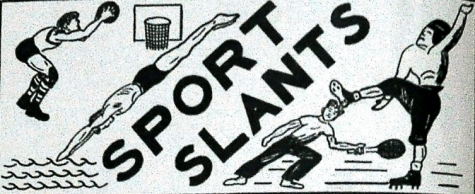
Feb. 1952: CENTRAL IS SQUAD CHAMPION OF GOLDEN GLOVES [BOXING] TOURNAMENT
Central High’s boxing team had lost to City High in the squad championship for the Golden Gloves Tournament. The first tabulation found City High as the winner with 26 points, while Central came in second place with 18. However, there had been an error in the scorekeeping. It was not in accordance with the rules set by coaches and officials before the tournament.
“Points were figured on fights alone and didn’t include unopposed champions.”
Central’s boxing coach at the time, Ken Hudgins, organized a protest against the false tally of scores. Despite his efforts, it had been announced that the claim to the overall trophy was final.
60 years ago…
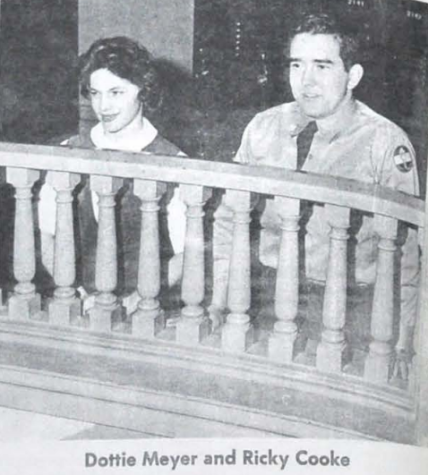
1962: SHOUTOUT ON SENIOR: DOTTIE MEYER AND RICKY COOKE
The Digest features seniors Dottie Meyer and Ricky Cooke.
Meyer wanted to attend Valparaiso University and planned to become a Lutheran Deaconess.
“If you see Dottie, she’s bound to be busy with her zillions of school or church activities!”
Cooke had been a faithful pounder for six years, and he was aspiring to get a scholarship to Harvard University and to later become a successful writer.
“You’ll find [Cooke] at Eastdale Methodist Church on Sunday morning, but watch for him to be at any church in the city come Sunday night.”
56 years ago…
Feb. 1966: CENTRAL DOMINATES AREA SPORTS
Central’s Purple Pounders was reputable for being one of the best basketball teams in the state. The current season at that time had been a very eventful one. Here are the highlights of the 1966-67 basketball season for Central: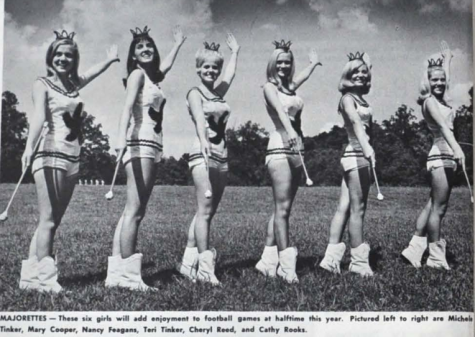
- The Purple Pounders were undefeated in Tennessee and earned the title of State Champions.
- Central was rated as one of the top teams in the state by sportswriters during that season as well as the one before.
- Finished in second place at the Hamilton Interscholastic League.
- Central’s alternate captain, Jim Dillard, received a trophy for “best defensive player” in the regional tournament.
- The Pounders had reached the semi-finals but lost to their arch-rival, Bradley County.
- Steve Snyder and Captain John Shinew were voted to the annual All-City Team.
45 years ago…
Feb. 1977: CENTRAL BAND TO PLAY IN PARADE AT DISNEY WORLD
On Friday, March 24th of 1977, Central’s ninety-piece band departed to spend a night at Disney World. After marching in the parade that night with three other high-school bands, they spent the night in a hotel. The students spent all of the following day as guests of the “Magic Kingdom”. The band members gave an impressive amount of effort toward fundraisers by selling license plates and citrus fruits.
“We can get a lot of exposure because more people will see us in thirty minutes than they would in two years of marching at football games.” –Mr. Roger Wolfe
Looking Back: The Digest Takes On a Challenge Against City High
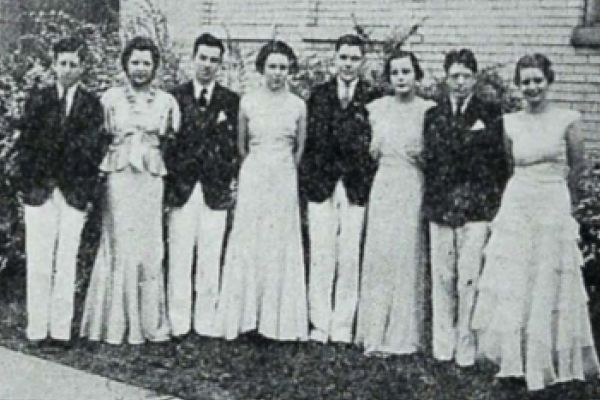
Preservation of Chattanooga Central History
MR. AND MISS CENTRAL ’35 NOMINEES — Left to right: Ellis Pope, Katherine Rawlings, William Lowery, Estelle Godley, T.W. Parker, Leila Welch, Ernest Ownbey, and Louise Wallace.
EDITOR’S NOTE: The following article contains summaries of articles from past issues of The Central Digest. On occasion, the Digest will look back into our archives to see what was happening around Central High in the past
16 Musicians Go To Knoxville
October 1934
Sixteen of the 21 Central students who applied for the East Tennessee Orchestra were selected to participate after a two year cessation due to financial struggle; the East Tennessee Orchestra was able to resume the year. The Orchestra was led by Professor Norvall from the Church of Columbia University. They performed “Titus Overture” by Mozart, “Symphony No. 1” by Beethoven, “Marche Militaire” by Saint-Saens, “Andante Contabile” by Tschaikawasky, and “Blue Danube” by Strauss.
Seniors Present “The Lilies of the Field” Tomorrow Evening
December 1934
On December 7, 1934 the seniors of Central High performed “The Lilies of the Field.” The play focused on the twin daughters of the Vicar of Wideleete: Catherine and Elizabeth. The play focuses on the twins trying to earn the favor of Barnaby Hadden and earn a trip to London from their grandmother. Elizabeth wins the competition and thrives in London, while Catherine later arrives in London and soon falls in love with an Englishman.
T.W. Parker Wins Gorgas Contest
February 1935
T.W. Parker was selected to represent Central in the State Gorgas Memorial Institute Essay Contest, where he was able to participate in the National Contest. Parker’s essay on “Gorgas Control of Transmissible and Other Preventable Diseases,” was chosen as the best out of 298 students who submitted essays. Parker was an associate editor to the Central Digest, a member of the Senate, as well as the National Honor’s Society.
Digest Staff Challenges City
March 1935
The Central Digest staff challenged the Maroon and White staff members, City High School’s newspaper, to a paper selling contest. Copies of the Central Digest were sold in the lunchroom as well as homeroom. A year prior, the Maroon and White challenged the Digest to the same competition. The Central Digest ended up victorious in the competition.
Lowery and Godsey Elected Mr. and Miss Central: Seniors Feted Today
April 1935
Estelle Godsey and William Lowery were selected by the student body as Mr. and Miss Central for the class of ’35. They were presented those titles on Senior Day alongside their fellow nominees. This was the third year where students selected Mr. and Miss Central. After the presentation, there was a Senior Class Luncheon held in the cafeteria.
For those interested, the archived Central Digest publications can be found on the Preservation of Chattanooga Central History website: https://chattanoogacentralhistory.com/digest/
Looking Back: The Christmas Spirit of Central High
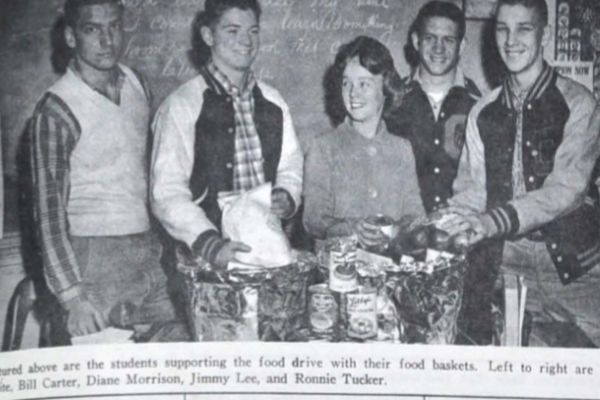
Preservation of Chattanooga Central History
THE GIVING SPIRIT OF CENTRAL — (Left to right) George White, Bill Carter, Diane Morrison, Jimmy Lee, and Ronnie Tucker are students supporting the food drive with their food baskets.
EDITOR’S NOTE: The following article contains summaries of articles from past issues of The Central Digest. On occasion, the Digest will look back into our archives to see what was happening around Central High in the past.
Christmas Baskets
December 1934
The tradition of creating Christmas baskets was long celebrated at Central. The Christmas baskets allowed students to give aid to anyone in need during the Christmas season. The baskets gave way to a great opportunity to help those burdened by poverty and hardships, while the rest of the world was celebrating and feasting. A competition arose between the homerooms to see who could conjure up the best basket. Competing not only brings fun into giving, but encourages students to go the extra mile to help those in need.
Enjoy the Spirit of Giving
December 1941
On this Christmas season, Central students were only given a one week break to celebrate the holiday, but they were sure to make the most of it. However, they should not forget what this season is actually about: giving. Think of the ones less fortunate than you, ones who cannot afford the basic necessities of living. The many organizations that we give to during the season have a great purpose. They ensure that everyone, regardless of economic struggles, can enjoy the Christmas season.
Christmas, Christmas Everywhere
December 1957
Christmas is celebrated worldwide, but not in the same way as here in the United States. In France, families set up a nativity scene in the living room. On Christmas Day, they gather together to eat, burn incense, and sing. In Ireland, candles are set up in every window and doors are left open throughout the house. This is to showcase the hospitality of the season. Worldwide differences in Christmas customs emphasize the true spirit of the season.
Christmas Food Baskets To Be Filled by Homeroom
December 1961
The Christmas baskets were quickly filled by Central students this year. Basket collection started on December 4 and continued until December 19. The student council delivered the baskets on December 19 to poor and needy families in the Chattanooga area, with an emphasis on Central students. Any remaining baskets were donated to the Salvation Army. Each basket was uniquely decorated by each homeroom. Central was able to show the holiday spirit in a special and unique way.
Underprivileged Children Receive Christmas Toys
December 1975
Many children have gone through the season with no presents, no joy, and no Christmas. They could not afford the festivities of the season. Luckily, the Forgotten Child Fund made sure that these children could finally have a Christmas of their own. The organization was started in 1963 by policemen who wanted all children to have something new to enjoy on Christmas Day. They believed Christmas was for all children, not just those fortunate enough to celebrate it.
For those interested, the archived Central Digest publications can be found on the Preservation of Chattanooga Central History website: https://chattanoogacentralhistory.com/digest/
Looking Back: New Vocational School Caused Problems for Students at Start of 1976-1977 School Year
EDITOR’S NOTE: The following article contains summaries of articles from past issues of The Central Digest. On occasion, the Digest will look back into our archives to see what was happening around Central High in the past
New Vocational School Affects Central’s Start Time and Reduces Offered Courses
September 1976
The opening of the Harrison Bay Vocational School caused several problems for Central during its 1976-1977 school year. The new vocational school forced Central to change its previous starting time of 9:00 to 7:25. Many students complained about the drive to school, for they got caught up in the daily working commute. The school also limited Central’s vocational classes on campus. The decline in vocational courses also caused an increase in overcrowded study halls.
As Child Abuse Increases, Many Children are Killed and Injured Yearly
November 1976
Chattanooga citizens were shocked after a four-year-old child in Cleveland passed away as a result of abuse. The tragedy opened the eyes of everyone in the area, as they realized how serious the problem was. At the time, the city of Chattanooga was notified of roughly 10-15 child abuse cases per week. In 1976, child abuse was only a misdemeanor, while many people considered upping it’s classification to a felony. There are many clues to note in child abuse victims including, but not limited to, undernourishment, repetitive scars, and an overall fearful attitude.
Ten Students Selected For All-State Chorus
February 1977
All ten of the Central students who tried out for the All-State Chorus were accepted in 1977. The ten Central students that were chosen were Mike Atkins, Sherry Bankston, Donna Cate, Donna Dayton, Ellen Hendrix, Gil Highlander, Terrence Jones, Leah Mashburn, Rhonda Stophel, and Teresa Tate. The All-State Chorus tryouts were held at the University of Tennessee at Knoxville, where students were graded on their voice quality and overall preparedness. The students traveled to Memphis on March 24 for practice with the All-State Chorus and performed a concert on March 26.
Ten Percent of Teenagers in Area Suffer From Some Mental Illness
April 1977
National statistics reported that one out of every ten teens is dealing with some type of mental illness. The report presented the increasing rate of mental illness in teenagers. Research indicated that over eight percent of adolescents in the Chattanooga area deal with a mental disorder. The most common disorders recorded were depression and schizophrenia. None of the mental disorders had led to suicides in the area over the past year, but the threat of it was still looming over everyone.
With Spring Season Comes an Invasion of Insects
May 1977
Since the beginning of spring, many Central students and faculty had reported problems with all sorts of bugs on campus. Mosquitoes, spiders, termites, and several nests were spotted around Central’s campus. Administrators called to see what could be done, and were put on a list of over 300 businesses and institutions with similar problems. There was little explanation for the sudden increase in insect activity in the area.
For those interested, the archived Central Digest publications can be found on the Preservation of Chattanooga Central History website: https://chattanoogacentralhistory.com/digest/

